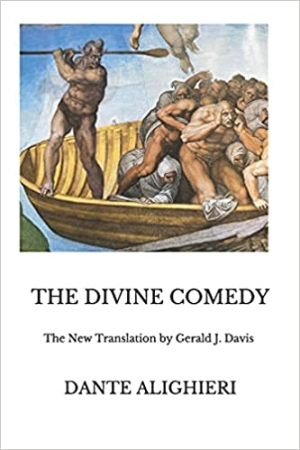The Divine Comedy
The New Translation by Gerald J. Davis
Gerald J. Davis’s translation of the epic poem The Divine Comedy is faithful to the themes of its source material.
Gerald J. Davis’s translation of The Divine Comedy is a sentimental revival of Dante Alighieri’s classic poem about the afterlife.
Entering the spiritual world of the dead, the book’s hero visits the souls of the departed in three sections: hell, purgatory, and paradise. In each, he witnesses the torments and rewards that people earned in their time on Earth, sees people he recognizes from his own life, and reflects on symbols that connect the spiritual world to the material one.
The epic, written in 1320, was the first to employ the verse style of terza rima and consists of one hundred cantos. It was also written in the vernacular rather than in Latin, with a narrator who is assumed to be Dante himself. Davis’s translation is true to the scope and vision of the original, but uses prose instead of poetry. This narrative version is both ambitious and loving. The epic’s lines are transfigured into a story that leans into classical, sometimes stilted language.
“Were I a mirror I could not reflect your thoughts more precisely,” Dante’s guide, the Roman poet Virgil, tells him as they step into the inferno. The structure of such thoughts aims to mirror the source material’s intention; the lines read like near literal translations of the original cantos. Davis’s reversed phrases cleave to the high poetic style of Dante’s epic.
Still, this translation’s phrasing and word choices obscure the story’s sense of traveling. Further, its characters are described with solemnity, not mirth; and while each section is riddled with symbolic numbers, symbols, and actions, their meanings are not made explicit. Here, with Dante’s dream of a hideous woman with clubbed feet, deformed hands, and a sallow face who appears “when the Geomancers see their Fortuna Major rise in the East in the stars of Aquarius and Pisces,” the witch becomes a siren, and the significance of her transformation, and the astrological placements described in the dream, are glossed over.
Davis’s translation eschews footnotes and end notes, compromising the inside jokes, numerology, and cultural significance of Dante’s passages; much of the richness of the original is lost in the process. Still, the integrity of Dante’s flowing dialogues, clear images, and literary phrases, including “Abandon all hope, you who enter here,” is maintained. And Beatrice, who guides Dante into paradise, is still a compelling character who acts as a pure, irresistible example of courtly romance, transforming Dante into his better self.
Gerald J. Davis’s translation of the epic poem The Divine Comedy is faithful to the themes of its source material, if not its ephemera.
Reviewed by
Claire Foster
Disclosure: This article is not an endorsement, but a review. The publisher of this book provided free copies of the book and paid a small fee to have their book reviewed by a professional reviewer. Foreword Reviews and Clarion Reviews make no guarantee that the publisher will receive a positive review. Foreword Magazine, Inc. is disclosing this in accordance with the Federal Trade Commission’s 16 CFR, Part 255.

